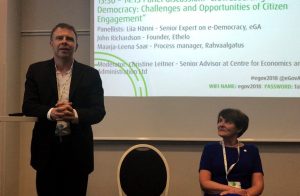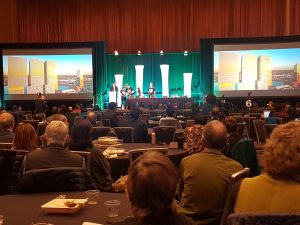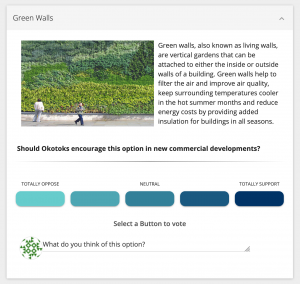As destructive as technology and media may be on our modern democracy, some digital tools could in fact support effective democratic processes.
A Vancouver tech company says it’s using artificial intelligence and cloud-based technologies to help us make tough decisions and set important social policies. From setting a small town budget to tackling the global climate emergency, digital platforms like the one developed at Ethelo are opening up new opportunities for consultation and collaboration as part of a growing eDemocracy movement.
Ethelo began as a nonprofit in 2011; within a few years the online engagement platform it developed was delivering a reliable revenue stream so the company reformed as two main operating areas: a nonprofit organization, Ethelo Democracy, and a tech solutions provider, Ethelo Decisions. Ethelo Decisions undertakes commercial projects to fund the development of the Ethelo technology, which is provided to Ethelo Democracy and its partners for the cost of the hardware.

John Richardson, CEO and founder of Ethelo, speaks at the 2018 e-Governance Conference in Estonia about the use of technology in supporting citizen engagement. The 2019 International Conference on eDemocracy: Safeguarding Democracy and Human Rights in the Digital Age will be held in Athens Greece. Ethelo provided image.
One of the latest applications for the Ethelo Democracy technology platform is an environmental awareness campaign and online carbon budgeting tool for managing – reducing – our use of greenhouse gases.
Climate crisis activist and campaigner Ben West has joined the Ethelo team to kick-start the eDemocracy Solutions public engagement process that will include micro-targeted strategic communications to increase public participation in the carbon pricing process.
West says eDemocracy Solutions will also launch a series of related pilot projects in B.C., across Canada and internationally working with partners in government, NGOs and community organizations in the coming months.
“We had all the technology and understanding we need to reduce our greenhouse gas pollution decades ago,” West said. “However, our current democratic processes have failed to facilitate meaningful change. A breakthrough in participatory democracy technology and effective community engagement could be a game-changer.”

Ethelo and eDemocracy proponent Ben West spoke about climate communications and effective public engagement at the EcoCity World Summit in Vancouver last month. EcoCity Twitter image.
That’s because many of today’s issues are not solved with simple yes/no equations (although strident social conversations and inflexible political positions these days seem to indicate otherwise); rather they depend on a flexible multi-pronged approach that can blend multiple perspectives into an effective, efficient and widely embraced course of action.
Ethelo’s proprietary and customizable algorithms are in place to do just that: questions and surveys that gather information for an Ethelo decision-making process are flexible, not binary: there are degrees of responses and a slider-bar approach to answering questions and providing information: choice are not simply black-and-white, replies are more than yay-or-nay, like or not like.

More than 350 residents of Okotoks, Alberta provided a thousand comments as part of a technology-supported development of the town’s Environmental Master Plan.
Ethelo’s e-democracy platform allowed a real conversation to happen online, and town officials could see a general consensus forming as participants shared their perspectives. Ethelo image.
Ethelo’s technology is based on patented algorithms that carefully combine stakeholder-input intelligence and information to help identify decisions with the broadest support, rather than outcomes that leave behind only winners and losers. Effective decision-supporting technology points to the least polarizing results, the greatest potential for consensus and a path to tackling contentious issues.
The Ethelo system uses authentication methods such as access codes and email confirmation to identify qualified participants and appropriate activities. Tools are available to eliminate spam or robot accounts, and the platform and its intelligence-gathering capabilities can be monitored through an advanced moderation panel to review, edit or delete flagged comments.
Data privacy and security is protected by end-to-end https encryption and security protocols for private cloud storage on servers located in either (at the user’s choice) Canada or the United States.
“Climate change is such a polarizing topic that it makes it extremely difficult to clearly identify the best policies to focus on in our community and know which policies will divide us further,” West described in an online announcement. “And yet we have to figure it out. Our very existence depends on it.”
He sees Ethelo’s technology as highly effective at engaging large, diverse groups in solving complex social and environmental problems while avoiding solutions that only create winners and losers. “This is a platform designed to reduce conflict and find the solutions with the best chance of achieving social license,” West said.
# # #

Climate change is such a polarizing topic that it can be extremely difficult to identify the best policies. eDemocracy platforms like Ethelo’s can be highly effective at engaging large, diverse groups in solving complex problems.
-30-



